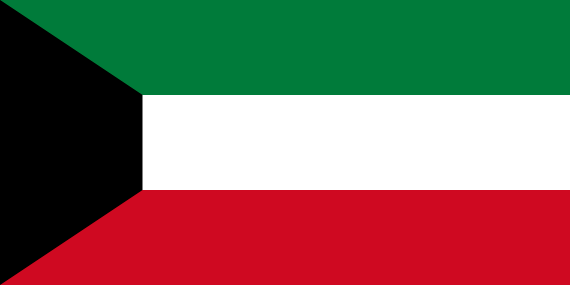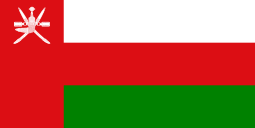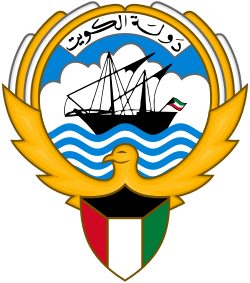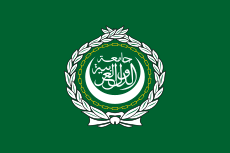Sabah Al-Ahmad Al-Jaber Al-Sabah
| Sabah Al Ahmad Al Jaber Al Sabah | |
|---|---|
_(cropped).jpg) | |
| Emir of Kuwait | |
| Reign | 29 January 2006 – present |
| Predecessor | Saad Al-Salim Al-Sabah |
| Heir apparent | Nawaf Al-Ahmad Al-Jaber Al-Sabah |
| Prime Ministers | |
| Born |
16 June 1929 Kuwait City, Kuwait |
| Spouse | Fatuwah bint Salman Al-Sabah (died 1990) |
| Issue |
Sheikh Nasser Sheikh Hamad Sheikh Ahmed (deceased) Sheikha Salwa (deceased) |
| House | House of Sabah |
| Father | Ahmad Al-Jaber Al-Sabah |
| Mother | Munira Othman Al-Saeed |
| Religion | Sunni Islam |
Sheikh Sabah IV Ahmad Al-Jaber Al-Sabah GCB (Hon) (Arabic: الشيخ صباح الأحمد الجابر الصباح; born 16 June 1929)[1] is the Emir of Kuwait and the Commander of the Kuwait Military Forces. He was sworn in on 29 January 2006 after confirmation by the National Assembly. He is the fourth son of Sheikh Ahmad Al-Jaber Al-Sabah. His Highness the Amir of the State of Kuwait Sheikh Sabah Al-Ahmad Al-Jaber Al-Sabah was honored by the United Nations Organization on September 9, 2014 and named leader of humanitarian work.[2] On March 2017, he has been awarded the Honorary Doctorate from Kuwait University for his humanitarian and global role.[3]
Early life
Al-Sabah was born on 16 June 1929.[4] He received primary education at Al Mubarakya School during the 1930s and then completed his education under tutors. He is the half-brother of the previous Emir of Kuwait, Sheikh Jaber Al-Ahmad Al-Sabah, who appointed Sabah as Prime Minister in July 2003, replacing the Crown Prince of Kuwait, Sheikh Saad Al-Salim Al-Sabah. He had previously been Foreign Minister for 40 years, from 1963 to 2003, making him one of the longest-serving foreign ministers in the world.
Foreign minister of Kuwait
Prior to being the Emir of Kuwait, Sabah was the Foreign Minister of Kuwait between 1963 and 2003.[5] During his time as Foreign Minister, Sabah restored Kuwaiti international relations after the Gulf War. Sabah was a pillar in the restoring the country after the Iraqi Invasion.
He was also First Deputy Prime Minister while serving as Foreign Minister.[6]
Reign
Dynastic crisis of January 2006

On 15 January 2006 the emir, Sheikh Jaber, died, making Sheikh Saad, Crown Prince of Kuwait, the new emir.[7] With the accession of Sheikh Saad, Sabah was likely to become the new Crown Prince, retaining his function of Prime Minister. However, the Constitution requires that the Emir be sworn in before Parliament, and the oath of office is complex; soon the word began to spread that Sheikh Saad was unable to take the oath in full. Some reports suggested that he suffered from Alzheimer's disease or some other debilitating disease; it was generally agreed that he was unable to speak, at least at any length.[8] After a power struggle within the ruling family, Sheikh Saad agreed to abdicate as the Emir of Kuwait on 23 January 2006 due to his illness.[9] The ruling family then chose Sheikh Sabah as the new Emir of Kuwait. On 24 January 2006, Kuwait’s parliament voted Emir Saad out of office, moments before an official letter of abdication was received.[10] The Kuwaiti Cabinet nominated Al-Sabah to take over as emir. He was sworn in on 29 January 2006 with the National Assembly's approval, ending that crisis.
Government crisis of March 2008
Al-Sabah dissolved the National Assembly on 19 March 2008 and called for early elections on 17 May 2008, after the cabinet resigned in the week of 17 March 2008 following a power struggle with the government.[11]
2012 parliamentary suspension
A struggle broke out between the government and parliament in 2012; he consequently dissolved the parliament.[12][13]
Significant laws passed during his reign
- An increase of his stipend from 8 million KD (approximately $25 million) to 50 million KD (approximately $188 million) annually
- A media law said to be one of the strongest laws protecting press freedom in the Arab world[14]
Other positions held
- Member of the Central Committee Municipality Council from 1954 to 1955.
- Member of the Building and Construction council.
- Chairman of the Social Affairs and Labour Authority in 1955.
- Member of the Higher Council of Country Affairs in 1956.
- Chairman of the Printing and Publishing Authority from 9 September 1956 to 17 January 1962
- Minister of Information - in the first cabinet that took power after independence in the period of Sheikh Abdullah Al-Salim Al-Sabah, on 17 January 1962.
- Foreign Minister since 28 January 1963.
- Deputy Prime Minister on 16 February 1978 in addition to his post of Foreign Minister.
- First Deputy Prime Minister and Foreign Minister on 18 October 1992.
- Member of the Supreme Council of Planning in 1996, headed by the Crown Prince Sheikh Saad Al-Salim Al-Sabah.
- Chairman of the Cabinet's Joint Ministerial Committee on Priorities of Governmental Work.
- Prime Ministers of Kuwait from 13 July 2003 to 29 January 2006.
- Honorary Trustee of the Metropolitan Museum of Art in New York
Personal life
Al-Sabah's wife, Sheikha Fatuwah bint Salman Al-Sabah, died before 2 August 1990. She was a first cousin of his father, Ahmad Al-Jaber Al-Sabah. He has two sons, Sheikh Nasser (Deputy Prime Minister and Minister of Defence), and Sheikh Hamed. Sheikh Sabah also had two other children who died. His daughter, Sheikha Salwa, died from breast cancer on 23 June 2002 in London.[15] The Emir named his palace "Dar Salwa" (the House of Salwa) after her. His fourth child, Sheikh Ahmed, died in a car accident in 1969.
The Emir travels regularly to Oman (specifically Salalah in the Dhofar Governorate),[16] where he owns a small island and goes fishing for leisure. He also frequently goes to Somalia to hunt.[16]
Humanitarianism
Former President Jimmy Carter calls Sheikh Sabah a "global humanitarian leader" saying, "His support of disaster relief, peace efforts and advancing public health are an inspiration. Other world leaders can learn from the wise example set by my friend, His Highness the Amir."[17]
According to the 2014 Middle East Coutts Report, the Amir provided the largest individual donation in 2013 among GCC members in support of Syrian refugees in neighboring countries, amounting to US$300 million.[18] Also in 2014, The former United Nations Secretary-General, Ban Ki-moon, cited the Amir as a Humanitarian Leader globally and presented him with a Humanitarian Award recognizing this role.[19][20] Ban Ki-Moon further remarked "It gives me great pleasure and honour to be here today to recognize the leadership of His Highness Sheikh Sabah Al Ahmad Al Jaber al Sabah, Amir of Kuwait. This is a great humanitarian day. We are sitting together with a great humanitarian leader of our world".[21]
In 2015, the Amir pledged a Kuwaiti donation of $500 million toward easing the Syrian humanitarian crisis at the UN Summit convened in Kuwait.[22]
In August 2017, UN Secretary General Antonio Guterres expressed gratitude for the Gulf country's leadership in humanitarian action, as well as the “dialogue […] and promotion of understanding Kuwait has shown in relation to all conflicts in the region,' adding, 'But it's not only the humanitarian leadership of Kuwait, it's the wisdom, the dialogue, the promotion of understanding that Kuwait has shown in relation to all conflicts in the region. Kuwait has no agenda. The agenda of Kuwait is peace; is understanding.”[23] Mr. Guterres further noted the positive role played by the Amir of Kuwait in the current GCC crisis.[24] and recalled that when he was High Commissioner for Refugees (June 2005 to December 2015[25]) the Amir presided over the three conferences to mobilize the international community to support the Syrian people.[26]
Mediation and conflict resolution
The Amir is a respected regional and international mediator due in part to his place in the Gulf Cooperation Council's leadership order and his forty years of service as Kuwait Foreign Minister and Prime Minister.[27] Under the leadership of the Amir, Kuwait has acted as a go-between for Pakistan and Bangladesh, Turkey and Bulgaria, Palestine and Jordan, factions in the civil war in Lebanon, and for all the Gulf States and Iran.[28] In 2016 the Amir hosted several UN-sponsored meetings of leaders from the warring factions in the Yemeni Civil War.[29]
The Amir quickly established Kuwait as the key mediator from the region in the Qatar diplomatic crisis, meeting with Saudi and Emirati officials on 6–7 June before leaving for Doha to discuss the rift with Qatari leaders.[27] His on-going efforts have been publicly supported by Qatar [30] and the other interested parties from the region as well as the US, UK, France and Germany.[28] At the beginning of September 2017, The Amir discussed the situation with top officials in Washington, including President Donald Trump who 'hailed his efforts' to mediate and 'applauded Kuwait’s “critical contributions to regional stability”'[31] There was some questioning from the boycotting countries regarding any preconditions.[32] President Emmanuel Macron of France stated French support for the Kuwaiti leader's mediation efforts following a meeting in Paris on 15 September 2017, reiterating June 2017 statements of support for the Kuwait led initiative.[33][34]
Titles, styles and honours
Titles and styles
- 16 June 1929 – 13 July 2003: His Excellency Sheikh Sabah bin Ahmad Al-Sabah
- 13 July 2003 – 30 January 2006: His Highness Sheikh Sabah bin Ahmad Al-Sabah, Prime Minister of the State of Kuwait
- 30 January 2006 – present: His Highness Sheikh Sabah IV bin Ahmad Al-Sabah, Emir of the State of Kuwait[35]
Honours and awards
Kuwait national honours

- Sovereign Grand Master of the Order of Mubarak the Great.
- Sovereign Grand Master of the Order of Kuwait.
- Sovereign Grand Master of the Order of National Defense.
- Sovereign Grand Master of the Military Duty Order.[15]
Foreign honours
- International Organization for Migration – IOM Humanitarian Medal (24 November 2014)[36]






























Ancestry
| Ancestors of Sabah Al-Ahmad Al-Jaber Al-Sabah | |||||||||||||||||||||||||||||||||||||||||||||||||||||||||||||||||||||||||||||||||||||||||||||||||||||||||||||||||||||||||||||||||||||||||||||||||||||||||||||||||||||||||||||||||||||||||||||||||||||||||||||||||||||||||||||||||||||||||||||||||||||||||||||||||||||||||||||||||||||||||||||||||||||||||||||||||||||||||||||||||||||||||||||||||||||||||||||||||||||||||||||||||||||||||||||||||||||||||||||||||||||||||||||||||||||||||||||||||||||||||||||||||||||||||||||||||||
|---|---|---|---|---|---|---|---|---|---|---|---|---|---|---|---|---|---|---|---|---|---|---|---|---|---|---|---|---|---|---|---|---|---|---|---|---|---|---|---|---|---|---|---|---|---|---|---|---|---|---|---|---|---|---|---|---|---|---|---|---|---|---|---|---|---|---|---|---|---|---|---|---|---|---|---|---|---|---|---|---|---|---|---|---|---|---|---|---|---|---|---|---|---|---|---|---|---|---|---|---|---|---|---|---|---|---|---|---|---|---|---|---|---|---|---|---|---|---|---|---|---|---|---|---|---|---|---|---|---|---|---|---|---|---|---|---|---|---|---|---|---|---|---|---|---|---|---|---|---|---|---|---|---|---|---|---|---|---|---|---|---|---|---|---|---|---|---|---|---|---|---|---|---|---|---|---|---|---|---|---|---|---|---|---|---|---|---|---|---|---|---|---|---|---|---|---|---|---|---|---|---|---|---|---|---|---|---|---|---|---|---|---|---|---|---|---|---|---|---|---|---|---|---|---|---|---|---|---|---|---|---|---|---|---|---|---|---|---|---|---|---|---|---|---|---|---|---|---|---|---|---|---|---|---|---|---|---|---|---|---|---|---|---|---|---|---|---|---|---|---|---|---|---|---|---|---|---|---|---|---|---|---|---|---|---|---|---|---|---|---|---|---|---|---|---|---|---|---|---|---|---|---|---|---|---|---|---|---|---|---|---|---|---|---|---|---|---|---|---|---|---|---|---|---|---|---|---|---|---|---|---|---|---|---|---|---|---|---|---|---|---|---|---|---|---|---|---|---|---|---|---|---|---|---|---|---|---|---|---|---|---|---|---|---|---|---|---|---|---|---|---|---|---|---|---|---|---|---|---|---|---|---|---|---|---|---|---|---|---|---|---|---|---|---|---|---|---|---|---|---|---|---|---|---|---|---|---|---|---|---|---|---|---|---|---|---|---|---|---|---|---|---|---|---|---|---|---|---|---|---|---|---|---|---|---|---|---|---|---|---|---|---|---|---|---|---|---|---|---|---|---|---|---|---|---|---|---|---|---|---|---|---|---|---|---|---|---|
| |||||||||||||||||||||||||||||||||||||||||||||||||||||||||||||||||||||||||||||||||||||||||||||||||||||||||||||||||||||||||||||||||||||||||||||||||||||||||||||||||||||||||||||||||||||||||||||||||||||||||||||||||||||||||||||||||||||||||||||||||||||||||||||||||||||||||||||||||||||||||||||||||||||||||||||||||||||||||||||||||||||||||||||||||||||||||||||||||||||||||||||||||||||||||||||||||||||||||||||||||||||||||||||||||||||||||||||||||||||||||||||||||||||||||||||||||||
See also
References
- ↑ Profile of Sabah IV Ahmad Al-Jaber Al-Sabah
- ↑ Diwan Al-Amiri - Government of Kuwait - http://www.da.gov.kw/eng/hhamir/hhamir.php
- ↑ Government of Kuwait, http://www.da.gov.kw/eng/hhamir/hhamir.php
- ↑ "CV of HH Shiekh Sabah Al Ahmed Al Sabah". Al Diwan Al Amiri.
- ↑ "Independence and building the modern state". Al Diwan Al Amiri. Retrieved 12 October 2013.
- ↑ "Profiles of Ministers". APS Review Gas Market Trends. 21 June 1999. Retrieved 20 April 2013.
- ↑ "Kuwait mourns after emir dies". The Guardian. Retrieved 27 March 2017.
- ↑ "The Kuwait Succession Crisis and the New Leadership". The Estimate. 27 February 2006. Archived from the original on 3 November 2012. Retrieved 7 December 2006.
- ↑ "Kuwaiti parliament votes to replace emir with Prime Minister". The Independent. Retrieved 27 March 2017.
- ↑ Tim Butcher (24 January 2006). "Kuwait in crisis as sick emir abdicates". The Telegraph. Archived from the original on 3 November 2012. Retrieved 3 November 2012.
- ↑ "Emir steps in to stem Kuwait's conflict". CNN. 19 March 2008. Archived from the original on 3 November 2012. Retrieved 3 November 2012.
- ↑ "Kuwait opposition to boycott vote, calls for protests". Chicago Tribune. 3 November 2012. Archived from the original on 3 November 201. Retrieved 3 November 2012. Check date values in:
|archivedate=(help) - ↑ Kristian Coates Ulrichsen (20 June 2012). "Political showdown in Kuwait". Foreign Policy. Archived from the original on 3 November 2012. Retrieved 3 November 2012.
- ↑ Jefferson Morley (3 November 2012). "Arab Press on Trial Again". The Washington Post. Archived from the original on 3 November 2012. Retrieved 3 November 2012.
- 1 2 3 "KUWAIT16".
- 1 2 أمير الكويت يتحدث عن سلطنة عمان - الفريسي (in Arabic). YouTube. 17 April 2009. Archived from the original on 3 November 2012. Retrieved 3 November 2012.
- ↑ White, Andrew. The Amir of Humanity. London Wall. p. Title page. ISBN 978-0995566736.
- ↑ "Coutts Million Dollar Donors Report 2014" (PDF). Coutts.com. Retrieved 9 March 2017.
- ↑ Barreto, Alejandro (9 September 2014). "UN Secretary General pays tribute to Kuwaiti Amir for Humanitarian Leadership". www.scribd.com. UN Office for coordination of humanitarian affairs.
- ↑ "Kuwait's 'Exemplary Humanitarian Leadership' Has Saved Thousands of Lives, Secretary-General Says at Ceremony Recognizing Amir of Kuwait". www.un.org. 9 September 2014. Retrieved 10 September 2017.
- ↑ United Nations: Kuwait’s ‘Exemplary Humanitarian Leadership’ https://www.un.org/press/en/2014/sgsm16132.doc.htm
- ↑ Ahmed Hagagy; Noah Browning; Omar Fahmy (31 March 2015). "Kuwait emir pledges $500 million for Syrian humanitarian crisis". Reuters. Retrieved 7 September 2017.
- ↑ "UN chief Guterres lauds country's humanitarian leadership, regional diplomacy". www.un.org. 27 August 2017. Retrieved 10 September 2017.
- ↑ Esraa Ismail; Chris Moran (28 August 2017). "Kuwaiti Emir, UN Secretary-General discuss country's humanitarian role". WAM. WAM. Retrieved 9 September 2017.
- ↑ "United Nations Secretary General biography". www.un.org. Retrieved 10 September 2017.
- ↑ "Secretary-General's press encounter after meeting His Highness the Amir of Kuwait". www.un.org. 27 August 2017.
- 1 2 Cafiero, Giorgio; Schatz, Jesse (27 August 2017). "Stakes high for Kuwait as mediator in Qatar crisis". Al-Monitor. Intra-Gulf relations: Al-Monitor - the pulse of the Middle East. Retrieved 17 September 2017.
- 1 2 Salama, Samir (24 July 2017). "Kuwait does what it does best - mediation". News: Gulf News. Retrieved 17 September 2017.
- ↑ Cafiero, Giorgio; Schatz, Jesse (27 June 2017). "Stakes high for Kuwait as mediator in Qatar crisis". Al-Monitor. Intra-Gulf relations: Al-Monitor - the pulse of the Middle East. Retrieved 17 September 2017.
- ↑ Irish, John (12 June 2017). "Qatar backs Kuwait mediation efforts over rift with Arab States". Reuters. Retrieved 17 September 2017.
- ↑ Lee, Matthew (7 September 2017). "Trump hails Kuwait mediation on Qatar; offers own services". Washington Post. AP. Retrieved 17 September 2017.
- ↑ Matthew, Lee; Gambrell, Jon; Al-Qatari, Hussein (8 September 2017). "Trump hails Kuwait mediation on Qatar; Arab states react". ABC News. AP. Retrieved 17 September 2017.
- ↑ "France wants active role in supporting Kuwait mediation on Gulf crisis". KUNA. 15 September 2017. Retrieved 17 September 2017.
- ↑ Fuentes, Gonzalo (15 July 2017). "France wants mediator role in Qatar crisis". RFI English. Reuters. Retrieved 17 September 2017.
- ↑ "Al-Sabah Dynasty". royalark.net. Archived from the original on 3 November 2012. Retrieved 3 November 2012.
- ↑ "IOM Recognizes Humanitarian Achievements of Amir of Kuwait". iom.int. Retrieved 24 March 2017.
- ↑ "United Nations Secretary-General Ban Ki-moon's Statements". un.org. Retrieved 16 September 2014.
- ↑ "Emiri i Kuvajtit, si po e shndërron sheshin 'Skënderbej'". 2010-03-28. Archived from the original on 2010-06-19.
- ↑ "ВСТРЕЧА ПРЕЗИДЕНТА АЗЕРБАЙДЖАНА ИЛЬХАМА АЛИЕВА И ЭМИРА ГОСУДАРСТВА". Газета Бакинский рабочий. 11.02.2009. Archived from the original on 2011-07-06. Check date values in:
|date=(help) - ↑ "Al-Ahmad Al-Jaber Al-Sabah S.A. Sceicco Sabah Decorato di Gran Cordone" (in Italian). quirinale.it. Archived from the original on 3 November 2012. Retrieved 3 November 2012.
- ↑ Boletín Oficial del Estado
- ↑ Presidenti Topi dekoron Emirin e Shtetit të Kuvajtit, Sheikun Sabah Al-Ahmad Al-Jaber Al-Sabah me Urdhrin, President of Albania, 27 May 2012(in Albanian)
- ↑ "KUNA :: His Highness The Amir receives visiting Mexican President 20/01/2016".
- ↑ "Erdogan confers Kuwaiti emir with Order of State". Anadolu Agency. 21 March 2017. Retrieved 21 March 2017.
- ↑ Указ Президента України № 63/2018 «Про нагородження орденом князя Ярослава Мудрого»
External links
| Wikimedia Commons has media related to Sabah Al-Ahmed Al-Jaber Al-Sabah. |
- Al-Diwan Al-Amiri - the official website of the office of the Emir
Sabah Al-Ahmad Al-Jaber Al-Sabah Born: 16 June 1929 | ||
| Regnal titles | ||
|---|---|---|
| Preceded by Saad Al-Salim Al-Sabah |
Emir of Kuwait 2006–present |
Incumbent Heir apparent: Nawaf Al-Ahmad Al-Jaber Al-Sabah |
| Political offices | ||
| Preceded by Saad Al-Salim Al-Sabah |
Prime Minister of Kuwait 13 July 2003 – 29 January 2006 |
Succeeded by Nasser Mohammed Al-Ahmed Al-Sabah |

